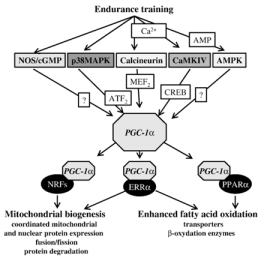The ‘Train Low, Compete High’ Protocol for Endurance Training
April 30 2011
Train low: Train low means to perform your training under low glycogen levels.
Compete High: Means competing under high glycogen levels.

Why do you need glycogen?
Energy : Carbohydrates you eat are broken down into glucose and stored in your muscles as muscle ( and liver) as glycogen. Glycogen is your primary energy source for endurance events like long distance running and such.
Sports nutrition guidelines: Hence current sports nutrition guidelines recommend a high carbohydrate intake for endurance training. This is called the “train high, compete high” approach.
So why train with low glycogen?
If glycogen is required for energy, why train at low glycogen levels? This goes against the conventional training wisdom, right?
Cellular Signal Pathways: The recent discovery of the several molecular pathways activated during endurance training (AMPK, P38, MAPK and so on shown in the figure) shows that these signaling protein are activated to a greater extent when exercising with low muscle glycogen than normal or high glycogen levels. These pathways play a critical role in making new mitochondria and activating other training adaptations.

2005 Study: The 2005 study by Hansen confirmed these suspicions. In this study, seven untrained males undertook a 10-week program of leg knee extensor ‘‘kicking’’ exercise. Interestingly, the study showed a “two fold” increase in time to fatigue in the Low glycogen leg compared to the high glycogen leg which goes completely against the current training philosophy.
The study seems to show that it might be the lack of substrates (glycogen) and not the surplus of substrates which activates the endurance training adaptations.
What about training and performance measures?
But the question is will this concept of Train low, compete high work for trained individuals and translate to increased performance?
Studies: Number of studies was conducted to see if there is an improved performance with low glycogen training. Guess what, none of the studies saw any increase in performance measures besides the increase in these signaling pathways.
This is another classic example of how it is so important to test our hypothesis with meaningful outcomes before jumping to any conclusions, not matter how sensible and beautiful the hypothesis may be.
So why didn’t we see any performance improvements?
- There may not exist a direct relationship between performance and the cellular events measured. So increase in AMPK may not mean a thing when it comes to increasing performance.
- Muscle function is just one factor in determining performance. Performance might be dictated by an integration of several factors such as the nervous system, mechanical efficiency and such
- We lack the tools sensitive enough to detect small increments in performance.
- Training with low glycogen can have negative effects on training intensity and the health of the athlete which might compensate for the positive effects of low glycogen training
- Finally, there might be some complex combination of training and nutrition which we haven’t nailed it yet.
Practical Consideration
- There is no clear advantage of training with low glycogen levels on performance measures, atleast from the current studies
- Elite athletes already might be training with low glycogen levels due to practical reasons. Sessions done after overnight fasting, with low carbohydrate levels, twice a week sessions can stimulate low glycogen training.
- If low glycogen training is attempted it is better to do it early and away from your competition period.
Reference 1
Reference 2
Related Articles
| Sat April 30, 2011
I’ve always been very interested in this stuff. Same with taking different supplements during exercise to increase your performance. Is it a good idea to sip water mixed with glucose for example? Same thing only on a smaller scale.
Do you know if any of the studies measured something like mitochondrial respiration or anything like that? It could be that the mitochondria improved due to the higher AMPK, etc, but that the supply components like the heart and capillaries improved to the same degree or perhaps even less (depending on if intensity and duration was matched between them)
also, when it comes to matching the intensity and duration it’s important to note that for the sake of external validity, they should not be matched if the glycogen group is able to exercise for longer/higher intensity for the same amount of time.
| Sat April 30, 2011
Nice review, Anoop. Good job detailing the complexities of the topic.
Another thing to take into account is that AMPK has been shown to blunt mTOR signaling, thus downregulating myofibrillar protein synthesis. Although this is generally not a concern for endurance athletes (and perhaps might be deisrable), it’s certainly not a good outcome for anyone who seeks muscle development.
Brad
Anoop | Sat April 30, 2011
Hi Karky,
Thanks for the comment. Very good point. When they do low glycogen studies, they have different protocols. Some have twice a week sessions, some have fasted, some minimize the exogenous carbs and such. In the first study, the results could just have been due to a second bout of exercise than low glycogen.
Hi Brad,
Thanks for the comment. Good point, Brad. It might be one good reason not to do cardio around lifting. I hope you have heard about Dan’s Max Stimulation training which is based on the AMPK concept.
| Mon May 02, 2011
Does “low glycogen” apply for weight train (like hypertrophy)?
Anoop | Tue May 03, 2011
Hi Bruno,
Thanks for the comment.
Low glycogen causes the exact opposite adaptation for muscle growth. So for weight training, it is better to train with high glycogen levels.
As Brad wrote, AMPk can inhibit mTOR and AKt thereby blunting or decreasing muscle growth pathways. This was one of the groundbreaking discoveries of how endurance training suppresses muscle growth adaptations and vice versa.
| Tue May 03, 2011
Interesting topic.
In regards to muscle growth adaptations and AMPk: Where lies the tipping point?
It is tempting for people to stuff themselves with carbs (days) before weight training after reading your comments. So how much (muscle/liver) glycogen is enough to “call off” AMPk and so the suppression of muscle growth adaptations? (The anabolic diet somehow comes to mind)
Anoop | Wed May 04, 2011
Hi Fulldepelex,
Good question. I am not really sure.
All we can say is that it might be beneficial to train on a moderate or high glycogen than on low glycogen levels. And it is usually better to have your carbs around your workout anyways so that you have more energy.
| Wed May 04, 2011
Hmm, strangely I personally never really noticed any performance enhancing effect from eating carbs around my training. I even tested fasting before training and not even then noted less performance. (dieting for a week or longer DOES however influence my training performance.
I guess I’m deviant.
For the purpose of enhanced muscle growth though I will test increasing my daily carb intake a bit in the future to see if it has any effect over eating low carb.
| Wed May 04, 2011
By the way:
Is it possible to increase liver/muscle glycogen stores (enough for the muscle growth enhancing effect)with fats and/or protein alone? I saw a study recently that showed whey could increase glycogen, but this may not effect the pathway we are talking about. (can’t find this study anymore)
There is also a 10-week study in which the low carb group (ketogenic) gains far less muscle growth, but way more fat loss, than the carb eating (unchanged diet)group.
http://www.nutritionandmetabolism.com/content/7/1/17
| Thu May 05, 2011
recently I’ve read two articles by Anthony Colpo
on subject: Why Low-Carb Diets are Terrible for Athletes
part 1:http://anthonycolpo.com/?p=1498
part 2:http://anthonycolpo.com/?p=1535
| Fri May 06, 2011
Ok, I have read the article.
The quality of the article is all over the place and it could have been way shorter. IMO the first half (except the description of his own experience) and the first bit of the second half of the second half were pretty useless.
The article got interesting in the second half though.
Looking at the research he describes I would say that right now at least the essence of his conclusion is correct. Ketosis seems to be a not-so-anabolic phase/proces and an amount of carbs (depending on the amount of glycogen used) seem to significantly enhance performance progression.
Anoop | Tue May 10, 2011
One thing we have to careful when looking at these molecular pathways is that we are looking at just a snapshot of the events. Even if we keep the carbs high just for our workout, these signals may get muted further down the road if we cut back on our carbs for the rest of the time.
| Wed May 11, 2011
I agree, it could also be that a carb up every couple of days or so would be just as effective for enhancing performance progression. More research is needed imo to determine if carbs are needed weekly, daily or even several times a day to promote progression.
Experiments with humans may show better results with carb-containing diets, but it is not yet clear through which pathway these benefits are obtained. There seem to be some likely candidates though.
| Mon January 02, 2012
My personal experience agree with the findings. High glycogen levels = higher improvements.
>



